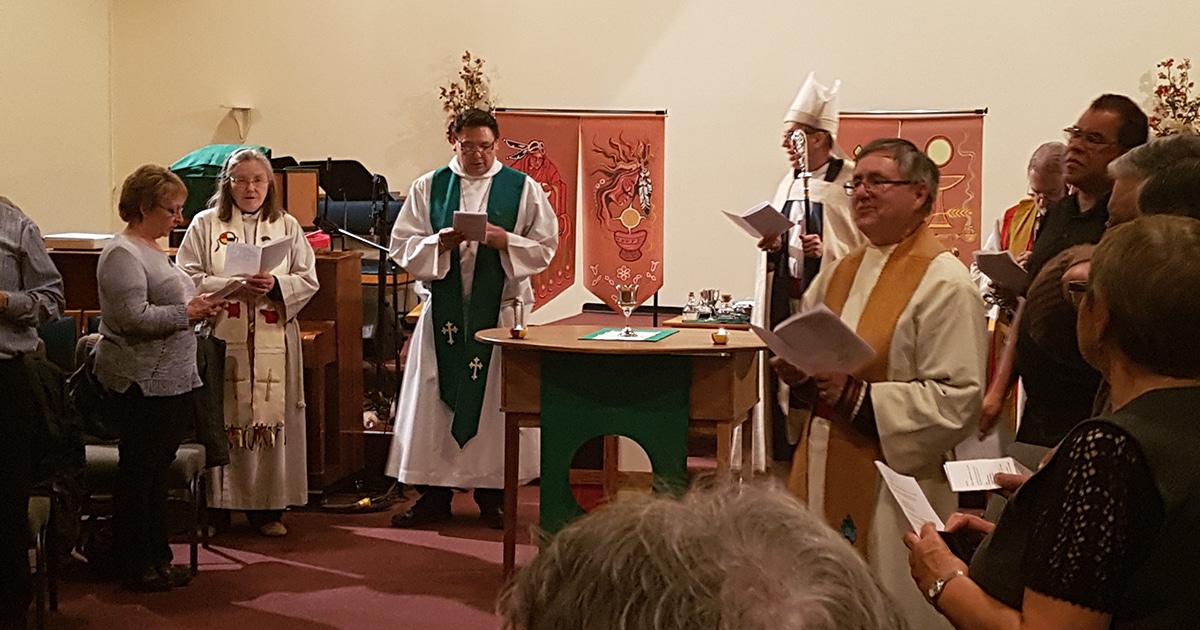As urban Indigenous ministry developer for the Diocese of Rupert’s Land, the Rev. Vincent Solomon plays the lead role in ongoing work to bolster Indigenous Anglican ministry in the city of Winnipeg—work that has three major components.
Responsible for growing and ministering to a new worshipping community, Solomon was installed as Incumbent at the opening service of Epiphany Anglican Indigenous Church on Feb. 12. The Rt. Rev. Donald Phillips, bishop of the Diocese of Rupert’s Land presided and National Indigenous Anglican Bishop Mark MacDonald preached at the ceremony.
To deepen healing and reconciliation within the diocese, local events are currently being planned to bring members of the community together—as Indigenous and non-Indigenous people, as Anglicans—for joint worship services, feasts, and conversation.
Perhaps the most critical component, in Solomon’s view, is a focus on healing by providing a safe place for Indigenous people who have endured trauma. Primary among the sources of this suffering is experiences in Indian residential schools—many of which were run by the Anglican Church of Canada—and the resulting intergenerational trauma.
Since September 2016, Solomon has provided pastoral care at St. Francis Mission Centre in north Winnipeg to those who have asked for it, providing a forum for people to talk through painful experiences within the context of traditional Indigenous and Christian forms of healing.
Clinical counselors, pastoral care workers, and elders, both Indigenous and non-Indigenous, are now in place and ready to hold regular talking and healing circles as more people in the Winnipeg community hear about the ministry being offered.
“The elders will be teaching on our traditional cultures, traditional values,” Solomon said. “That’s part of the healing process, I believe, for Indigenous people.
“We need a lot more of that, because it’s been taken away, and it had been taken away by the church, and so we need to replace that … in order for Indigenous people to get back to where we were before, which was a place of health and wellness.”
Bishop Don Phillips described the Indigenous ministry work spearheaded by Solomon as the “bringing to fruition” of work that has been going on in the Diocese of Rupert’s Land for decades.
The bishop said that the vision of a flourishing Indigenous worship community was first realized in the 1980s and 1990s, but gradually subsided as financial support dried up. It found new life about 10 years ago when the Rupert’s Land Indigenous Council and its program arm “Wechetowin” (Cree for “people helping people”) launched a full-time Indigenous Mission Developer position, until funding once again ran out three years later.
“The launch of Epiphany Indigenous Anglican Church provides a secure foundation from which Indigenous-led programs (in partnership with non-indigenous Anglicans) can flourish and help persons find healing and wholeness appropriate to their own journey,” Bishop Phillips said.
“An important part of accomplishing the spiritual restoration that must take place is the opportunity to experience mutual learning and reconciliation with non-Indigenous persons, and the talking and healing circles provide for this. Because this is a ministry immersed in the middle of our diocesan community, our whole diocesan family will be affected by its presence and invited to grow and learn from the wisdom and healing that emerges.”
Solomon’s efforts to promote urban Indigenous ministry in Winnipeg recently received a boost in the form of two $10,000 grants from the Anglican Foundation.
One grant will pay for items such as office furniture, computers, and a baptismal fount at Epiphany Indigenous Anglican Church. The other will cover the cost of honorariums and gas money for the counselors, educator training in traditional Indigenous and Christian forms of healing, pastoral care workers, and elders who often travel long distances to take part in the healing circles.
An Indigenous-led group called Rising Above recently provided training to the six counselors, pastoral care workers, and elders, half of whom are Indigenous and the other half non-Indigenous.
The session focused on the background of residential school experiences and the trauma that must be dealt with in terms of healing and counselling, which Solomon noted includes sexual, physical, and emotional abuse that took place within the residential schools.
“You compound that [abuse] with being stripped of your culture and your language, at the same time being told that you’re a worthless Indian … the trauma of having your culture taken away from you and your language taken away from you … [Being] taken away from the home of your parents and from learning about your heritage, and those kinds of things that people also need healing from.”
With the last residential school in Canada only closing in 1996, and the persistence of intergenerational trauma, demographics of people who have attended the healing circles will encompass a wide age range, from youth to seniors.
Solomon described the reception of the healing program within the Winnipeg community as “very positive” thus far.
“There is an interest out there for the services and the ministry that we will be providing and are providing … But it will be a very positive thing for the people who do come and talk through their own trauma,” Solomon said.
“Of course, it’s not all positive,” he added. “They’re in pain and they need to work this stuff through, and so the positive part of that is that they are willing and needing and asking for help, which is hopefully what we are giving them.”
Interested in keeping up-to-date on news, opinion, events and resources from the Anglican Church of Canada? Sign up for our email alerts .

